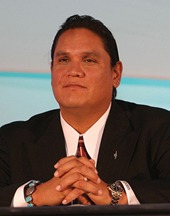
As the U.S. economy starts to improve and a different attitude takes hold in Washington, it’s time to review and look ahead on what NIGA has done and can continue to do during the next two years.
NIGA’s accomplishments over the past decade all work hand-in-hand. We couldn’t have done one without the other. They include successfully defending against legislative attacks on tribal sovereignty and the Indian Gaming Regulatory Act; building consensus among NIGA’s diverse member tribes and building coalitions with other organizations; and empowering tribal leaders and strengthening the voice of Indian Country.
IGRA. Protecting and preserving the integrity of the Indian Gaming Regulatory Act (IGRA) has been a crucial element of NIGA’s work over the past decade. Remember, IGRA is not our baby. The act imposes federal legal restrictions on the inherent authority of tribes to conduct gaming. However, Indian Country has learned to live with the act, and for more than 20 years we are making the act work for our communities.
In the past 10 years, NIGA faced legislative threats to amend IGRA in ways that would have attacked the integrity of the act. Some threats sought to grant Class III regulatory authority to the National Indian Gaming Commission (NIGC), in conflict with IGRA and hard-fought tribal-state compacts. Other attacks sought to add bureaucracy to the approval of management contracts, and to fix a problem with off-reservation gaming that didn’t need a legislative solution.
These challenges show the wide range of interests allayed against Indian gaming. These threats must be continually monitored and addressed when necessary.
For most of the past decade, the NIGC proposed a number of unworkable standards and regulations that threatened Class II gaming, and created great uncertainty in this area. Again, working with a strong coalition of our member tribes and others, we were able to fight back these misguided attacks.
Health Care Tax. In addition to protecting IGRA, we have consistently fought to preserve tribal sovereignty and the treatment of Indian tribes as governments in the area of federal taxation. We enjoyed a recent victory when President Barack Obama signed the Affordable Care Act into law in 2010. The act contains a provision that exempts tribal government-provided health insurance and health care services from the personal income of tribal members.
The United States has treaty and trust obligations to provide for the health care of all Native Americans. Sadly, the U.S. has too often not met that obligation, and our people suffer as a result. Some tribal governments refuse to wait on the federal government to step up, and have directly provided health insurance and health-care services to their citizens. Instead of working with these tribal governments, some federal officials sought to penalize them by taxing the health care benefits as personal income of tribal members.
Consensus and Coalition-Building. None of these successes could have happened without the ability to build consensus and coalitions. NIGA is made up of 184 diverse member tribes, of all shapes and sizes and needs. Our membership is our strength, and we are strongest when our voice is unified.
Consensus-building has always been a traditional process in Indian Country and one on which I personally rely. My father, Ernie, Tim Wapato and others have said that we must meet as often as necessary until we arrive at consensus, for the good of the community. In any one of the legislative challenges Indian Country has faced during my tenure, we could have splintered, and tribal sovereignty would have been compromised as a result.
However, NIGA’s membership has always united behind our core values of protecting tribal sovereignty—and maintaining the integrity of IGRA. These are two constants that bind all tribal leaders, and the base on which our success is built.
In addition, over the past decade, NIGA has built a strong working relationship with the National Congress of American Indians (NCAI) and other tribal organizations. Education and information is clearly the consistent basis for our ability to succeed in Congress and public forums. Working together, we are able to stretch the precious resources of all of our members to efficiently and effectively meet their goals and needs.
Empowering Indian Country. Finally, probably our greatest accomplishment is the empowerment of tribal leaders, and strengthening their voice before Congress. We’ve done this by passing on timely information to our tribal leaders, so they can weigh in with their congressional delegations.
In addition, to strengthen the contacts and to exercise the voices of NIGA’s member tribes, the association holds biannual Legislative Summits on Capitol Hill that bring senators, congressmen and high-ranking administrative officials together with tribal leaders to discuss proposed legislation and regulations that could affect Indian Country.
NIGA’s Annual Legislative Summits have become one of the premier venues for tribal leaders and federal policymakers to meet, discuss the latest issues, and educate new members of Congress. These summits have kept NIGA ahead of the game, when it comes to defending IGRA and tribal sovereignty. They are also coordinated with NCAI, NIEA and other organizations to make our common interests known in Congress in a fair and efficient manner.






